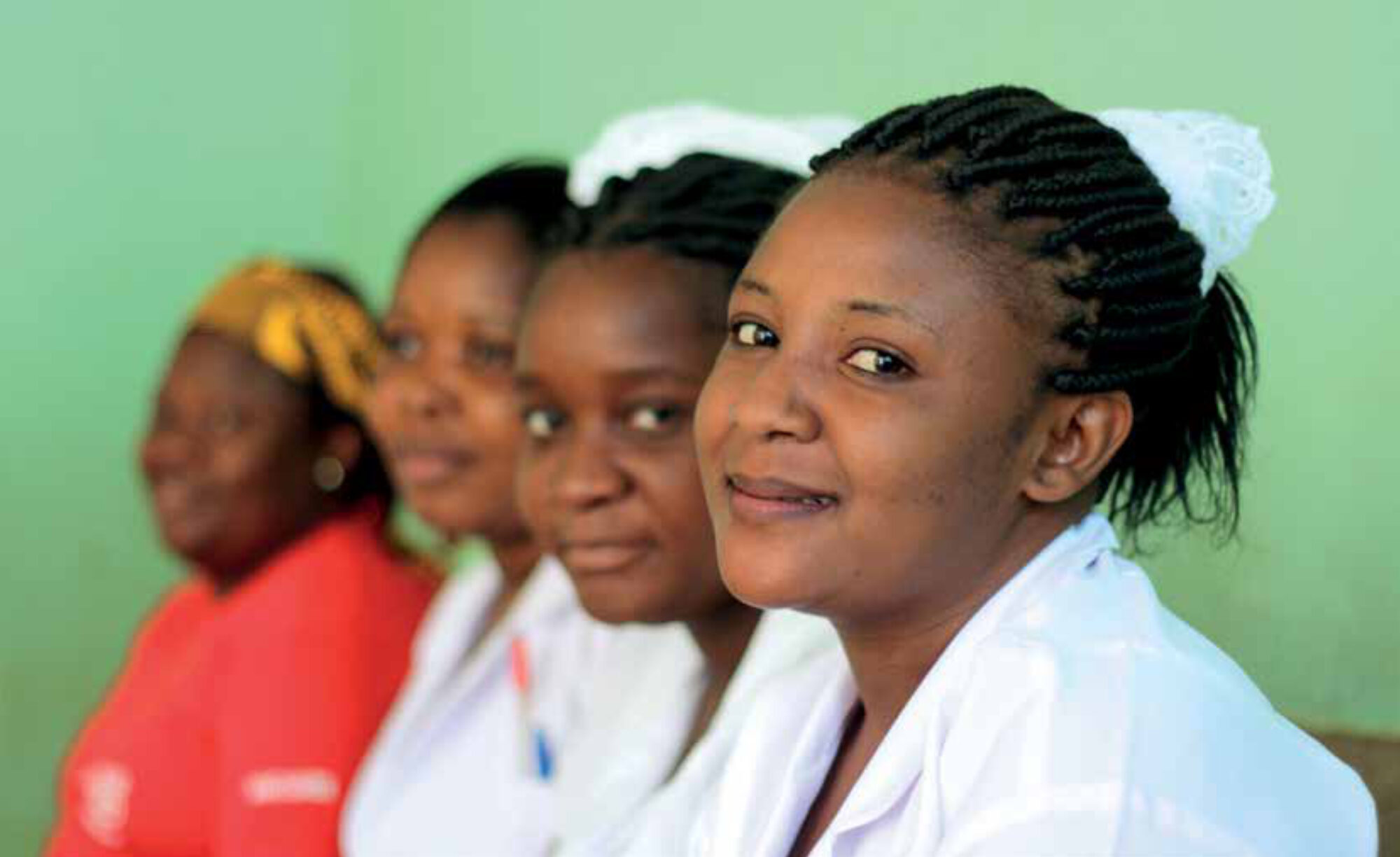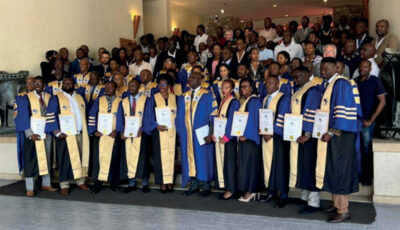Main content
Sierra Leone is one of the poorest countries in the world, with a Human Development Index ranking of 181 out of 195 countries.[1] The devastating civil war from 1990 until 2002 and the Ebola epidemic in 2014 disrupted the basic healthcare functions and infrastructure. The population still has poor access to safe and affordable health care services, especially to specialised health care services such as paediatric and neonatal care.[2] Sierra Leone has one of the highest neonatal and under-five mortality rates in the world, with 31 and 108 deaths per 1000 live births, respectively.[3] Lack of healthcare professionals is one of the main contributing factors. The most recent data from the WHO documents 566 physicians in the country, representing a density of 0.74 physicians per 100,000 people.[4]
Of these, only a few work in the area of paediatrics in the clinical context, serving a population of over seven million people out of which 13% are under five years old and 40% are under 15 years. The shortage of medical doctors is even worse in rural areas. Children in need do not receive medical care at all or receive care from insufficiently trained personnel. The lack of skilled health workers is considered a key factor for the high neonatal and under-five mortality rates. Globally, as an answer to the non-availability of human resources in low-resource settings, the WHO is promoting a model of task-sharing. In order to maximise the efforts of the existing workforce, tasks are rationally redistributed among healthcare workers.[5] The task-sharing approach has been tested, investigated and proven effective in other sub-Saharan countries.[6–8]
For example, 10 years ago, a successful task-sharing project was established in the field of surgical and obstetric care in Sierra Leone by the organisation CapaCare, in cooperation with the Ministry of Health and Sanitation (MOHS).[8]
In October 2021, the Ministry of Health and Sanitation of Sierra Leone, together with German Doctors, a German medical aid NGO, agreed to start a specialised Paediatric Training Programme (PTP) for clinical officers (COs) at the School of Clinical Sciences in Makeni (SCSM). Students can enter this programme after obtaining their diploma in clinical medicine at the SCSM. German Doctors and the SCSM closely collaborate in this project with two other international NGOs: the aforementioned CapaCare and Partners in Health (PIH), respectively responsible for the specialisations surgery/obstetrics and internal medicine. The 2-year bachelor paediatric specialisation training programme is a task-sharing project with the aim of increasing the number of clinically trained professionals in order to reduce child and neonatal mortality in Sierra Leone, in a manner comparable to other successful programmes in Sub-Saharan Africa.
Paediatric training programme
As stated before, the students can apply for the programme after obtaining their diploma in clinical medicine. The programme consists of four clinical rotations of half a year in various partner hospitals, alternated by advanced theoretical modules of a month taught by national and international trainers. The first theoretical module focuses on the basics of paediatrics, such as the Emergency Triage Assessment Treatment (ETAT) course, Helping Babies Breath, and malnutrition. The following modules cover the sub-specialisms within paediatrics, such as infectious diseases (with special focus on malaria, HIV, and tuberculosis), respiratory medicine, haematology, gastroenterology, nephrology, cardiology and neonatology. The modules focus most on the major causes of mortality in sub-Saharan Africa, as described by Perin et al in the Lancet in 2019 [9]. After finishing the 2-year programme and writing their dissertation, a one-year housemanship is required, which takes place in the national paediatric referral centre, Ola During Children’s Hospital in Freetown. After completion of the training, the graduates are rewarded with a Bachelor of Clinical Medicine. Twenty-two students are currently enrolled in the programme. The first students will complete their training in October 2024.
Strengths and challenges
One of the strengths of the Paediatric Training Programme is that the initiative for the programme came from the MOHS. The collaboration with the SCSM, which is affiliated with the University of Sierra Leone, was key for making it a recognized bachelor’s degree in Sierra Leone.
Due to it being a novel programme for the country, it still needs to gain recognition. At the start, the involvement of national trainers, especially for the theoretical modules was challenging. One reason for this could be the fact that there are only a few doctors and even fewer paediatricians and the country has long relied on foreign expertise and support. However, with the increasing number of students enrolled and the involvement of partner hospitals, Sierra Leonian physicians are seeing the benefit of having clinical officers dedicated to paediatric and neonatal care. Since the start of a national postgraduate training programme in paediatrics for medical doctors 1.5 year ago, paediatricians in training are now joining the theoretical blocks as trainers. Just like in the CapaCare programme, we hope to use graduates of the paediatric training programme to teach the upcoming batches. The aim is that in 10 years’ time the training will be fully run by Sierra Leonian paediatricians and experienced clinical officers, with minimal international support.
In October 2024, the first paediatric Clinical Officers (CO) will complete their training. Clinical officers are a new cadre in the healthcare system of Sierra Leone. Therefore, it is important that they are included in the governmental scheme of service and laws and are offered positions with an appropriate salary. In 2020, before the start of the programme, these issues were included in a memorandum of understanding between the international partners SCSM and MOHS. There are also national and international stakeholders and NGOs that are positive about the CO training programme. For example, UNICEF, who are currently running the Special Care Baby Units (SCBU) in Sierra Leone, have shown interest in employing paediatric clinical officers.
Conclusion
The Paediatric Training Programme in Sierra Leone can reduce the shortage of paediatric healthcare workers, thereby contributing to reducing neonatal and child morbidity and mortality. Collaboration with governmental institutions, local stakeholders, and national paediatricians is essential and makes the programme sustainable.
References
- UNDP. Human Development Report 2021. 2021. [Internet] Available from: https://hdr.undp.org/content/human-development-report-2021-22. [Accessed 11th April 2023]
- World Health Organization. Scoping review of interventions to maintain essential services for maternal, newborn, child and adolescent health and older people during disruptive events: web annex: summary of interventions and evaluations by type of event. 2021; [Internet} Available from: https://www.who.int/publications/i/item/9789240038318. [Accessed 11th April 2023]
- World Health Organization. WHO mortality-and-global-health-estimates. 2019. [Internet]. Available from: https://www.who.int/data/gho/data/themes/mortality-and-global-health-estimates. [Accessed 11th April 2023]
- World Health Organization. National Health Workforce Account Data Portal [Internet]. 2022. Available from: https://apps.who.int/nhwaportal/Home/Index. [Accessed 11th April 2023]
- World Health Organization. Task shifting: rational redistribution of tasks among health workforce teams: global recommendations and guidelines. 2007;
- Eckerle M, Crouse HL, Chiume M, Phiri A, Kazembe PN, Friesen H, et al. Building sustainable partnerships to strengthen pediatric capacity at a government hospital in Malawi. Front public Heal. 2017;5:183.
- Bolkan HA, Van Duinen A, Waalewijn B, Elhassein M, Kamara TB, Deen GF, et al. Safety, productivity and predicted contribution of a surgical task-sharing programme in Sierra Leone. J Br Surg. 2017;104(10):1315–26.
- Zhao Y, Hagel C, Tweheyo R, Sirili N, Gathara D, English M. Task-sharing to support paediatric and child health service delivery in low-and middle-income countries: current practice and a scoping review of emerging opportunities. Hum Resour Health. 2021;19(1):1–16.
- Perin J, Mulick A, Yeung D, Villavicencio F, Lopez G, Strong K, Prieto-Merino D, Cousens S, Black R, Liu L. Global, regional, and national causes of under-5 mortality in 2000–19: an updated systematic analysis with implications for the Sustainable Development Goals. Lancet Child Adolesc Health. 2022; 6: 106–15.



















































